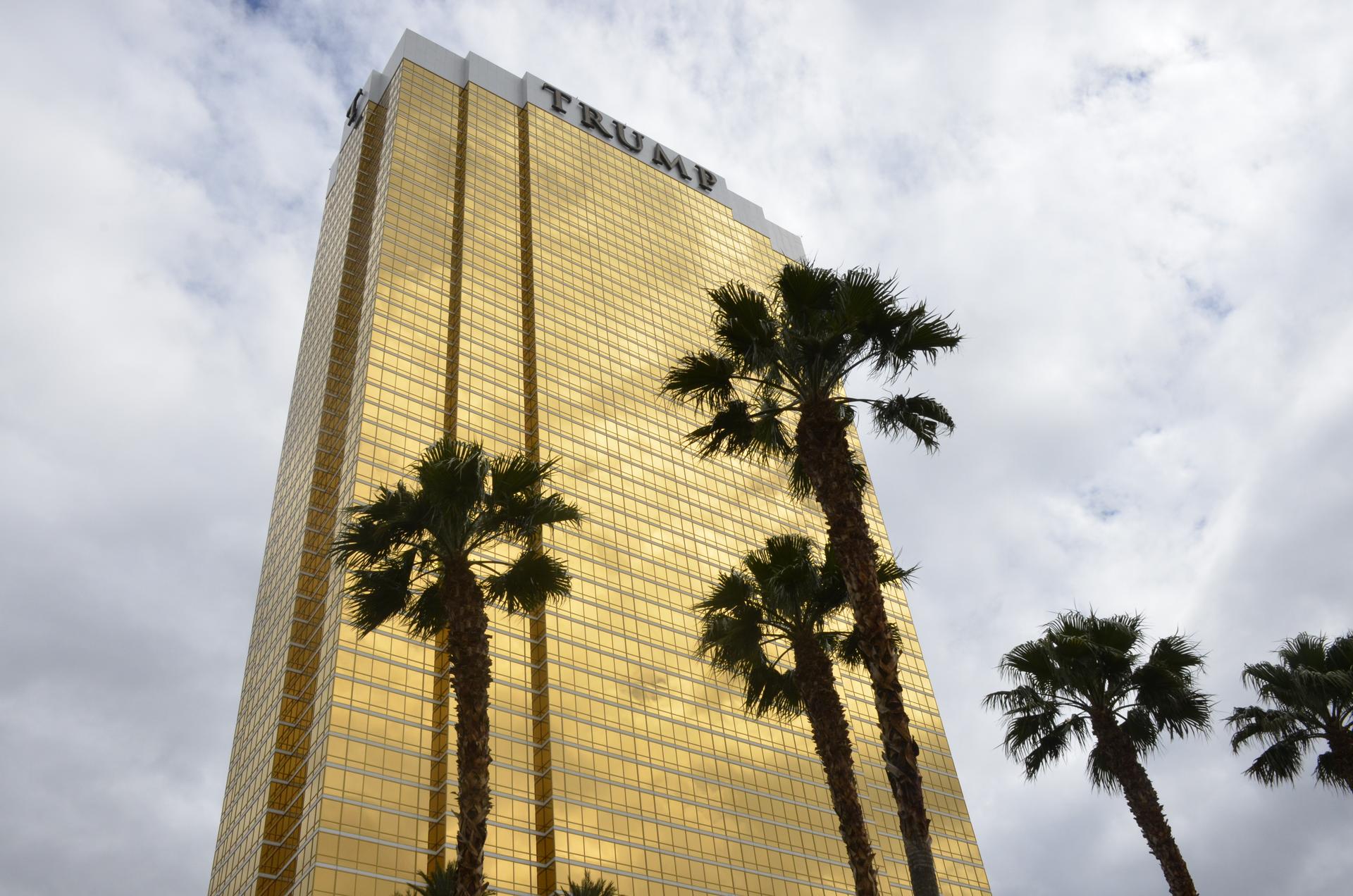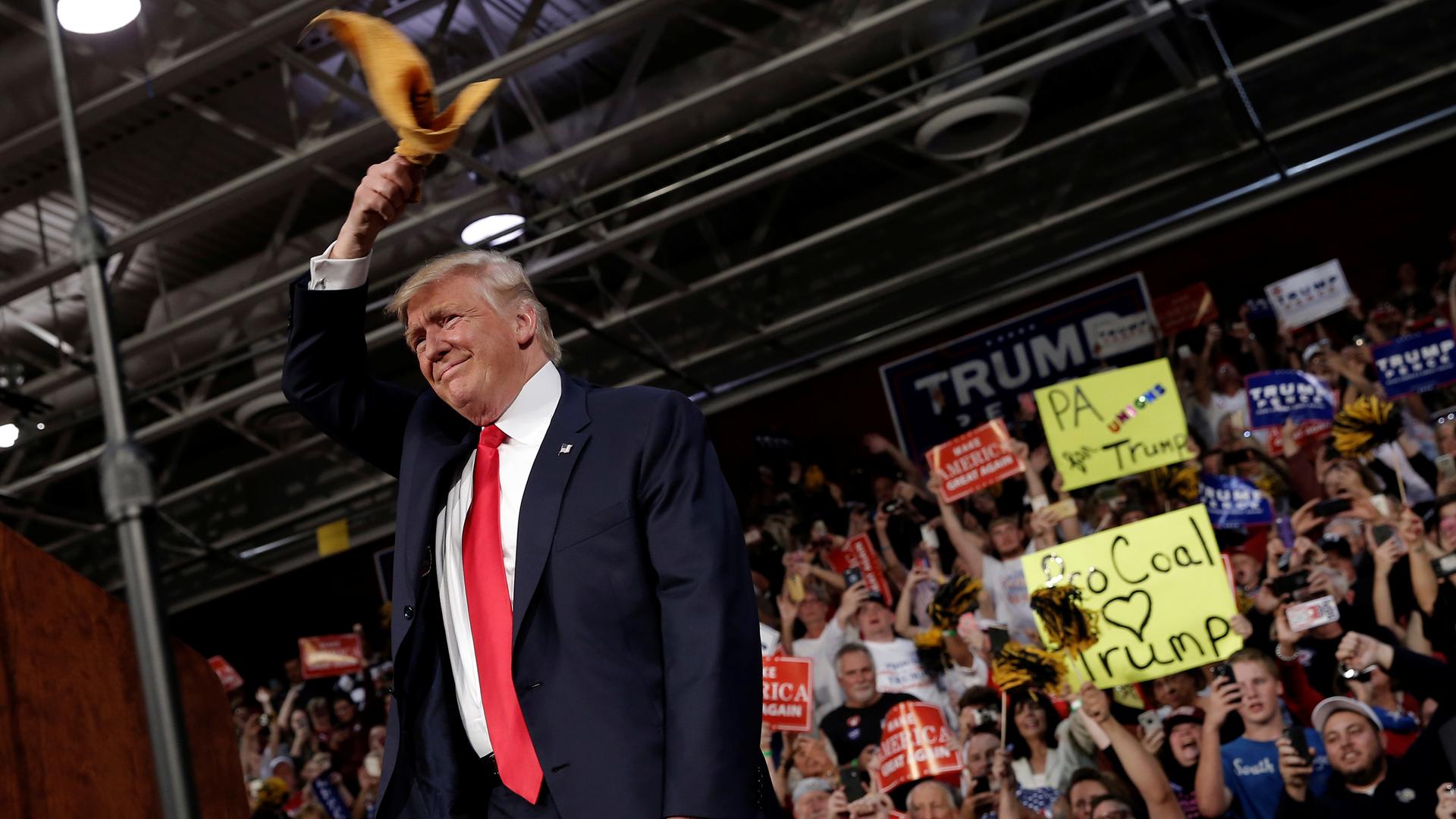Republican US presidential nominee Donald Trump arrives at a campaign rally in Ambridge, Pennsylvania, October 10, 2016. He waves "The Terrible Towel," the rally towel of the Pittsburgh Steelers.
If you stuck through Sunday night’s presidential debate until the bitter end, you may recall an exchange between Hillary Clinton and Donald Trump about steel.
“We have to bring back our workers,” said Trump. “You take a look at what’s happening to steel and the cost of steel, and China dumping vast amounts of steel all over the United States, which essentially is killing our steel workers and our steel companies.”
Clinton picked up the thread, saying, “China is illegally dumping steel in the United States, and Donald Trump is buying it to build his buildings, putting steelworkers and American steel plants out of business.”
For many, it was a confusing moment trying to decipher what the two candidates were arguing about.
First, let’s define the problem with the American steel industry today: overcapacity.
“Overcapacity is actually pretty simple, it’s when a country, or in aggregate the world, is producing more of something than it needs,” said Scott Paul, president of the Alliance for American Manufacturing, which was started in part by the United Steelworkers. “So the consumer demand is lower than the production.”
Simply put, right now, the world is awash in too much steel. Nearly half of the excess is coming from China. Paul argues that China operates by a different set of guidelines.
“Its steel industry is not profit motivated, it’s generally controlled by the government in Beijing — it’s used as an employment policy, as well as manufacturing,” Paul said.
The US and Europe can’t compete with Chinese prices, often below the cost of production. (This is an economics definition of “dumping.”) China has been violating existing international trade laws to do that. The result: around 15,000 American steel and iron workers have lost their jobs over the past year, and thousands more are facing potential layoffs.
So, that’s the situation. Now, let’s revisit Sunday night’s debate: the Republican candidate brought up China dumping steel first, to which the Democrat responded, “And Donald Trump is buying it to build his buildings.”
Here’s what Clinton is talking about. Last week, Newsweek reported that Trump purchased steel and aluminum from China for two of his high-profile construction projects in Las Vegas and Chicago. The buildings opened in 2008 and 2009. According to the Newsweek investigation, Trump purchased Chinese metals using shell companies in the British Virgin Islands.
That’s not a crime. But it infuriates Leo Gerard, president of the United Steelworkers Union.
“Trump is a phony. And quote me on that,” said Gerard. “In every facet of his life, he’s never done anything for anybody but himself.”
Gerard said Trump could’ve bought American steel. But he chose cheaper steel from China, then tried to hide it.
“Consistent with his behavior — we see what he did in his clothing line, we see what he did in his furnishing line, and we’re seeing what he’s doing with manufacturing goods,” Gerard said.
Despite the Newsweek article, Trump doubled down on his promises to bring back steel jobs on Monday, while speaking in Ambridge in western Pennsylvania.
“If I win, on day one your jobs are coming back to Pennsylvania, and they’re coming back to this area,” Trump said. “And that means we’re going to take care of our steel workers and we’re going to take care of our miners. Believe me.”
Economists seem to agree though: You can’t turn back the clock. In the 1970s, 250,000 people worked in the steel industry in Pennsylvania. Today, that figure to closer to 40,000.
Still, Trump’s message of hope, even without any specifics about how he’d restore jobs, resonates in steel country. I was in western Pennsylvania a few weeks ago and met a lot of people who liked Trump’s message.
“He’s really one of the first national candidates to speak at this local level about the want for industry. Just the fact that he’s engaged in this dialogue is something that many voters haven’t seen in a generation,” said Steve Toprani, who works for the city of Monessen, Pennsylvania.
“Just like any other politician, and now I have to put [Trump] in the politician mix, I don’t think they can do everything they say they can do,” said Benjamin Fisher, who owns a contracting company. “Why not give the guy a shot for four years? If it doesn’t work out, we can go back to all the politicians before.”
But bringing back some steel jobs, and keeping the ones that are currently in the US, requires smart policies on investment and trade.
Gerard with the United Steelworkers Union said Clinton has offered solid solutions working within the law to prosecute China for violating existing trade rules.
As for Trump … Gerard said he’s seen steel communities hollowed out, and he feels sympathy for people who are angry at the system and attracted to Trump, but he can’t stomach the idea that people are putting hope in the GOP candidate’s promises.
“It makes me a combination of angry, sad and disappointed,” said Gerard. “I think we’ve got time to continue to educate people, and I don’t want to see them having a broken heart another time.”

